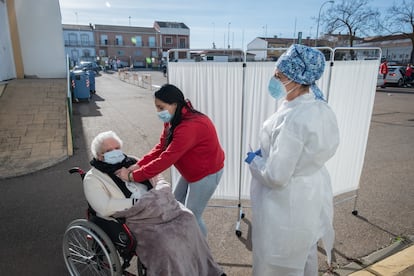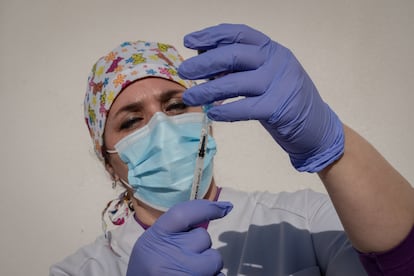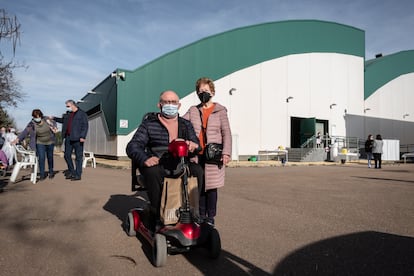Spanish region vaccinates 7,000 adults living with a disability in a week
Extremadura has completed an ambitious Covid vaccination drive for people with need for daily assistance who do not live in care homes

The Covid vaccination drive was scheduled to begin at 10am at the Wine and Olive museum in Almendralejo, a town of 33,855 people in Badajoz province in Spain’s western Extremadura region. But people began to arrive half an hour earlier. The mood at the venue, which was converted last week into a vaccination center, was a mix of hope and nerves. It was time to vaccinate adults who need daily assistance but do not live in care facilities. Some waited outdoors, sitting in their wheelchairs, others inside of cars. All were accompanied by their carers. Lorenzo García, a 93-year-old man in a wheelchair, summed up the general feeling: “I will no longer be afraid of the bug.”
Under a scorching sun, two police officers controlled the atypical traffic to the museum. A few meters away, nurse Manuel Romero waited at the entrance. He explained that the adults would be vaccinated in order of the list: 24 people every 30 minutes. Since the first vaccination day for this priority group was held last Tuesday, impatience has been growing for the next one. Despite this, everyone remained respectful.
Family played a key role on the day. Inés Guerrero wrapped a scarf around her mother, Carmen Álvarez, who suffers from Alzheimer’s disease. She gently explained to her 86-year-old mother that she was one of the “fortunate” people who would receive the first dose of the Pfizer-BioNTech vaccine: “The day has finally come!” Next to her was Ana Guijarra, a 74-year-old woman with reduced mobility. She was able to move thanks to her walker and husband, Manuel Retamar, who was there to support her like he has been doing “every day for the last 30 years.”

Extremadura last week took on the challenge of vaccinating 7,000 adults with need for daily care who are not in residences, and their professional carers in a week. This group included people who need help to carry out basic tasks, recognized as Grade III dependents under the Law of Dependency, those who have asked to be recognized in this category and those who, without having made any request, are accredited with suffering from a disease which requires them to have significant support measures.
Thanks to the support of family and health workers, the vaccination day was “surprisingly easy,” said the coordinator of the drive, Paula Salamanca. Red Cross teams, which facilitated up to 300 trips to the center, were also key. Salamanca said that it all comes down to teamwork: “If one of us fails, we all fail.”
Vaccination in cars
Brothers Manolo and Antonio García, who brought their father Lorenzo to the vaccination drive, confessed that they were expecting “something chaotic.” Their 93-year-old father, who is in a wheelchair and requires constant attention after suffering a stroke eight years ago, was vaccinated in their car. “It has all gone smoothly,” said Manolo. The logistics of a vaccination drive are always the same: four nurses administer the vaccine and provide Sintrom, an anticoagulant, to the patients who need it; an official checking the list; a doctor and two coordinators. José Ángel Seguet, the officer at last Tuesday’s drive, said the process works like a “well-oiled machine.”
It begins with the Extremadura regional government, which sends the list of adults living with a disability to different health areas. According to Seguet, everyone on the list is then given a date to get vaccinated in the next seven days. “Timing is key, a delay can derail everything,” he explained. The coordinator of the vaccination campaign, Ceciliano Franco, who is in direct contact with the central Health Ministry, described it as a “triple challenge” – a large number of people must be vaccinated in a short amount of time, those set to be vaccinated have limited mobility and there is the novelty of vaccinating in cars to deal with.

The nursing teams agreed with Franco: “It was a promising challenge and it has gone better than we hoped.” Francisco González, a 54-year-old with multiple sclerosis, said he was “a bit scared” when he arrived, but he received the vaccine with a big smile thanks to the “astronauts” dressed in white. Nurse Luis Brajones, with two face masks on, explained that it was not only a logistical challenge, but also a “human” one, given the delicate health of the adults. But the nurse said they were prepared for all eventualities: “We came equipped to the teeth. Defibrillators, adrenaline, saline solution … but so far there have been no complications.”
Many families had hoped their loved ones would be able to get vaccinated at home. This option was considered by the Spanish Medicines Agency (AEM), but according to the coordinator Franco, in Extremadura, practically no one has received the vaccine at home. Sources from the Health Ministry said that while the possibility was being discussed, it was eventually ruled out due to the Pfizer vaccine’s requirements. According to Marigé Peguero, who has vaccinated more than 100 adults with need for daily assistance, the Pfizer vaccine can be damaged if it is moved and doses can also be lost: “It has an ultra-cold conservation temperature and very little stability outside of these conditions.”
Criticism over decision to only vaccinate professional carers
During the vaccination drive, 77-year-old Isabel Antúnez asked two nurses coordinating the process: “Why are you not going to vaccinate me?” The health workers responded firmly: “We are following the official list.” Antúnez has been caring for her 54-year-old son Francisco, who has multiple sclerosis, for years and was upset that she would not receive the jab: “It doesn’t make sense, I live side by side with him.”
On February 8, the Health Minister confirmed that non-professional carers would be left out of the priority vaccination phase – a decision 58-year-old José García, who looks after his parents, also thought was “illogical.”

Around 134,000 people care for a dependent family member in Spain, of which 90% are women, according to data from the Association of Social Service Managers and Directors. Many of these carers are afraid of contracting the coronavirus and leaving their loved ones without any support. As Antúnez explained: “I don’t have the money to pay for professional help.”
The Health Ministry said it understands the problem, but explained that professional care workers typically see more than one patient: “By moving around so much, they get infected more.” The ministry added that the priority is the health of the dependent adult. In Extremadura, meanwhile, last week ended with the vaccination of 7,000 dependent adults and a pleased team of health workers: “What’s important is vaccinating well and fast.”
English version by Melissa Kitson.
Tu suscripción se está usando en otro dispositivo
¿Quieres añadir otro usuario a tu suscripción?
Si continúas leyendo en este dispositivo, no se podrá leer en el otro.
FlechaTu suscripción se está usando en otro dispositivo y solo puedes acceder a EL PAÍS desde un dispositivo a la vez.
Si quieres compartir tu cuenta, cambia tu suscripción a la modalidad Premium, así podrás añadir otro usuario. Cada uno accederá con su propia cuenta de email, lo que os permitirá personalizar vuestra experiencia en EL PAÍS.
¿Tienes una suscripción de empresa? Accede aquí para contratar más cuentas.
En el caso de no saber quién está usando tu cuenta, te recomendamos cambiar tu contraseña aquí.
Si decides continuar compartiendo tu cuenta, este mensaje se mostrará en tu dispositivo y en el de la otra persona que está usando tu cuenta de forma indefinida, afectando a tu experiencia de lectura. Puedes consultar aquí los términos y condiciones de la suscripción digital.








































